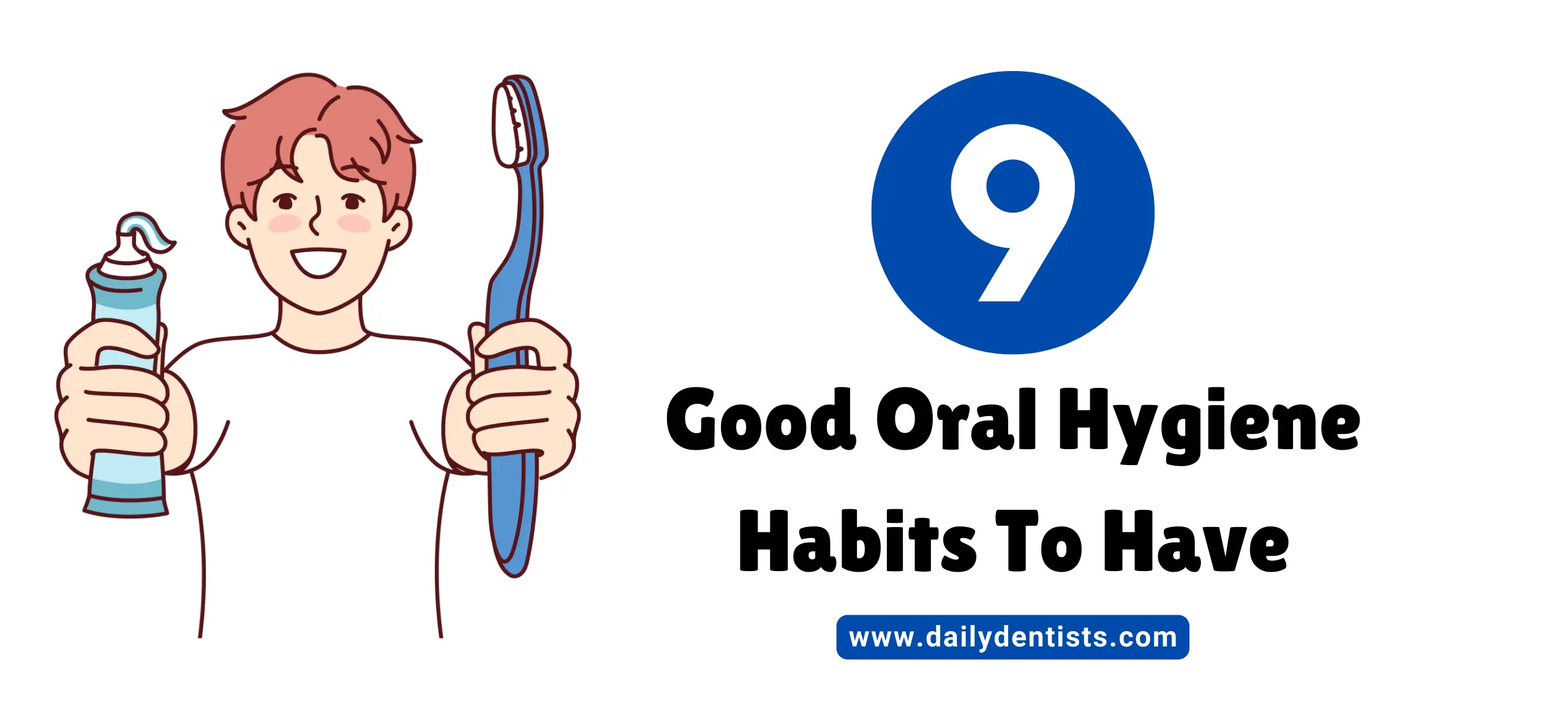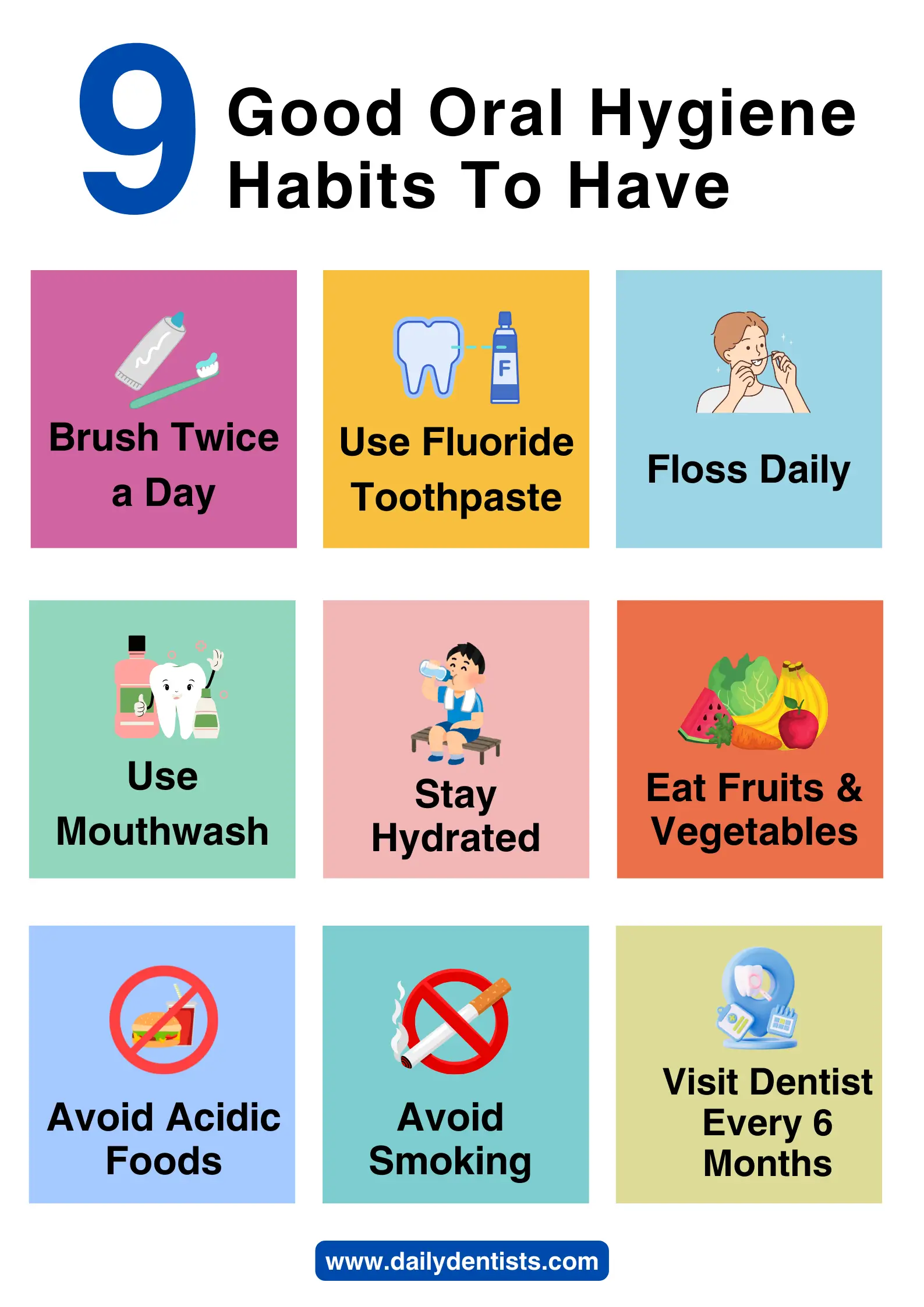Introduction
Oral hygiene practice is something that keeps you smiling healthy and beautiful so it is really important to develop and maintain the below habits. A proper oral care routine can prevent serious health issues and enhance overall well-being. In this article, we at Daily Dentists will explore the importance of good oral hygiene and detailed habits that everyone should adopt.
What Is Good Oral Hygiene?
Oral hygiene generally refers to the practices that keep the mouth clean and disease-free. These include flossing, brushing the teeth, and taking good care of the gums. It is all about having the right implements and skills in maintaining a healthy mouth. Visits to the dentist are also a big part of it. Proper oral hygiene will thus exclude cavities, gum diseases, and bad breath. With good oral hygiene, one can contribute to a healthy good smile and general health.
Importance of Oral Hygiene in Daily Life
Good oral hygiene is very significant in our daily life. It affects our eating and speaking habits. Moreover, it gives a smile on one’s face. Then one suffers from self-doubt, pain, and even worse medical conditions. Bacteria in the mouth may cause infections that may spread other parts of the body. For example, this can cause heart disease, diabetes, and respiratory infections. Good oral hygiene boosts self-esteem, saves on medical costs, and leads to a healthier lifestyle.
9 Good Oral Hygiene Habits To Have
1. Brush Twice a Day
It is a basic practice to brush your teeth two times every day because it is very essential for oral hygiene. You have to use the soft-bristled toothbrush while making sure that you brush for two minutes. Ensure you cover all surfaces of your teeth and brush your tongue. This removes plaque and prevents cavities. Brushing in the morning removes bacteria that accumulate overnight. Brushing before bed removes food particles and plaque that build up during the day.
2. Use A Fluoride Toothpaste
Fluoride is a material in the form of a mineral that helps to build up the surface of the teeth and at the same time protect them against damages such as decay. Use a toothpaste containing fluoride. This helps to protect your teeth from cavities. Fluoride toothpaste is safe and effective for daily use. It also helps to remineralize small cavities that are in the early stages. Check the toothpaste packaging to ensure it has the right amount of fluoride.
3. Floss Daily
Only by flossing will all the food particles and plaque be removed between your teeth. Dental cavity and gum disease prevent them by daily flossing. Bad breath also reduces it because the trapped food particles are decomposed. Use about 18 inches of floss, then slide it gently in between your teeth. Curve it around each tooth and move it up and down.
4. Use Mouthwash
Mouthwash helps to clean areas that brushing and flossing might miss. It reduces the amount of acid in the mouth and helps to re-mineralize the teeth. Mouthwash also reduces bad breath and freshens your breath. Choose an antibacterial mouthwash for the best results. Use it after brushing and flossing for a complete clean.
5. Keep Yourself Hydrated
There is a need for much water consumption in maintaining oral health. This helps in washing away food particles and bacteria. The advantages include keeping your mouth moist; hence, there is no risk of dry mouth. Dry mouth can lead to oral decay and gum diseases. It also keeps the acids produced from mouth-dwelling bacteria neutralized. You should take at least eight glasses of water in a day.
6. Include Fruits and Vegetables in Your Diet
Fruits and vegetables are good for your teeth and your gums because they contain various vitamins and minerals, especially those for oral health. Crunchy fruits and vegetables like apples and carrots act to remove food particles from the teeth. They have the effects of stimulating saliva which washes away other food particles, bacterial agents, and so forth. Eating a variety of fruits and vegetables will ensure you have a healthy mouth.
7. Avoid Acidic Foods
Acidic foods and drinks can erode tooth enamel. This makes your teeth more liable to decay. Limit your intake of acidic foods like citrus fruits, tomatoes, and soda. If you consume acidic foods, rinse your mouth with water afterward. Wait at least 30 minutes before brushing your teeth to avoid damaging the enamel.
8. Avoid Smoking
Smoking is harmful to your oral health. It stains your teeth and causes you to have bad breath in your mouth, breath that other people tell you is smelling horrible on you. Such bad breath in turn tells us whether or not someone might or might not have had any tobacco intake which constitute another reason why smokers cannot avoid this odor. It weakens your immune system that hinders you from fighting off infections. If you stop smoking, you will live longer because quitting actually helps keep our teeth strong enough while promoting whole healthiness. Seek support if you need help quitting.
9. Visit Dentist Every 6 Months
Routine visits to the dentist help you have healthy teeth. It is essential to see a dentist every six months for a cleaning and examination. Then, you can present various problems that your dentist will diagnose early before they progress. Cleanings done professionally remove plaque and tartar that you are not able to remove at home. The frequency of visits allows your dentist to give you personalized advice regarding your oral care routine.
Few Final Tips
- Avoid using a toothbrush with hard bristles since they may hurt your gums.
- Change the toothbrush every three or four months when the brushes are bristly or earlier.
- Prevent your teeth from being utilized as tools to rip off bundles or bite toe-associated nails.
- Chew sugarless gum to stimulate saliva production and clean your teeth.
- Make use of a tongue scraper for removal of bacteria and freshening your breath.
Conclusion
Good habits of oral hygiene are important for the mouth to be in its best state of health and in general. Brushing twice a day, flossing, and gargling with mouthwash are the basics. Hydration, a balanced diet, and the prohibition of dangerous habits like smoking add to the general oral health. Usually, dental checkups make it possible to catch problems early and treat them before they become serious. You could have an easy, healthy mouth and smile if you just care about these habits.


